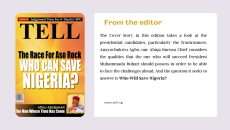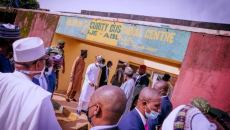Sometime in 2009, while on a visit to the United States, US, for a journalism programme, I had a discussion with an African American called Mark. As we got talking, I asked whether he had visited Nigeria. He smiled and said no, but that he didn’t look forward to visiting. “Why?” I asked. With a smile Mark told me how a friend of his had visited Nigeria and had to part with money at the airport as a way to avoid being delayed by some immigration officials. “I don’t think it’s something I would like to do,” he said, smiling again.
His statement having sunk, all I could do, at that point, was smile too. But to say I was embarrassed is to put it mildly. But Mark’s story didn’t shock me, as I was already familiar with the situation at the Murtala Mohammed Airport, having travelled out of Nigeria twice before that trip and passed through the airport each time. Indeed, even before that journey to the US, I had, in a conversation with a journalist friend, voiced out my feeling about the corruption that goes on in our airports. It was my own way of describing the conduct of officials of security agencies: the immigration, NDLEA and other security organs at the airport. There was, and still is, a nauseating culture of begging, intimidation, bribery and corruption that appears entrenched in Nigeria’s premier international airport and this, I was already aware of before meeting Mark.
But this write-up wouldn’t have been necessary had the situation changed. It never did, as subsequent journeys, the latest of which was my trip to Brazil in June this year, showed.
It all began at the check-in counter, where one of the three security officials, when it was my turn to be searched, suddenly said: “Oga, how weekend? …wetin you get inside the bag? I won’t bother to check so as not to stress you… Wetin you get for your boys?” Well, I had nothing for him and I told him so. They conducted their search and gave me a clean bill of health. The next was a staff of an airline who flashed a smile and, before I could pretend I didn’t understand the embedded message, dropped his own plea for a tip. I told him I should not be seen offering him money openly. He smiled and wished me well.
Next stop was the immigration point where I submitted my passport to one of the officials. He collected it and told me how pleased he was to be the first to stamp it, being a new passport. Like in earlier times, the message was clear, but I had nothing to make him happier than he said he was. Before getting to this point, however, I was informed by an airline staff that I needed to procure a yellow fever passport. “You have to get it before travelling, and it is available here in the airport for N1,000,” she told me. After checking in my luggage, she asked one of her colleagues to direct me to where to get the yellow fever card. He agreed to do so but soon told me that the office was crowded and that I might end up wasting my time if I went there. The best option for me, he said, was to get it through one of the boys in the office. He beckoned to a young man who he said would help get it. I asked to know how much. “N1,500,” he quipped. I replied that someone said it was N1,000 but he insisted it was N1,500. That was my experience that June 14, on my way to Brazil, but I was not alone.
It was the same story of begging officials when I returned to my country on July 7. As we all filed out, shortly after the arrival of the Qatar airline plane, one of the immigration officials asked one of the men he was attending to for money but the man, apparently unhappy about the request, turned the heat on him. He told the official he should be the one to give him money as he had been enjoying in Nigeria while he was away in a foreign country spending money and had exhausted his cash. The immigration official laughed off the matter before handing him his passport.
Few weeks after arriving Nigeria, a friend narrated a story of how a brother to a Zambian priest in Lagos arrived the Murtala Mohammed Airport and was asked to pay $50 for the point of entry visa but was given a receipt bearing $25. That apart, I later spoke to a young man who travelled to Malaysia on the day I was headed for Brazil, and as we recalled our experience at the airport, he said, “Nobody asked me how much money I was carrying in Malaysia.” He said the immigration procedure in Malaysia was so smooth and efficient and devoid of corruption or shenanigans as we see in Nigeria.
It was the same scenario at Hamad International Airport in Doha as well as the Guarulhos International Airport in Sao Paolo where I passed through. At no point did any of the security officials request or indirectly ask me for money. Chinua Achebe, in his book, There Was a Country, talked of Nigeria being the world’s laughing stock and here, for me, is one example. So, like someone asked, why is Nigeria different? Put another way, when will our country’s airports be like that of Doha, Sao Paolo, Malaysia or elsewhere?
I have had to ponder this question in view of the shame that continues unchecked at our airports. Why does corruption thrive at the airport? Is it the case of some officials working in league with some big ogas who they make returns to, a situation that allows them to continue with their despicable ways?
This is what Osita Chidoka, the new aviation minister, should look into. Stella Oduah, the former aviation minister, may have done well with her remodeling project that has given the Murtala Mohammed Airport a new look even as it does not rank anywhere close to that of Doha or Sao Paolo but the attitude of the security officials at the airport has not changed one bit. The thriving culture of bribery and corruption is alive and well at the nation’s airports and would need to be tackled. That, in my view, is the immediate task awaiting Chidoka.
Follow Us on Social Media



 WhatsApp us
WhatsApp us